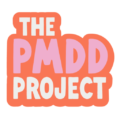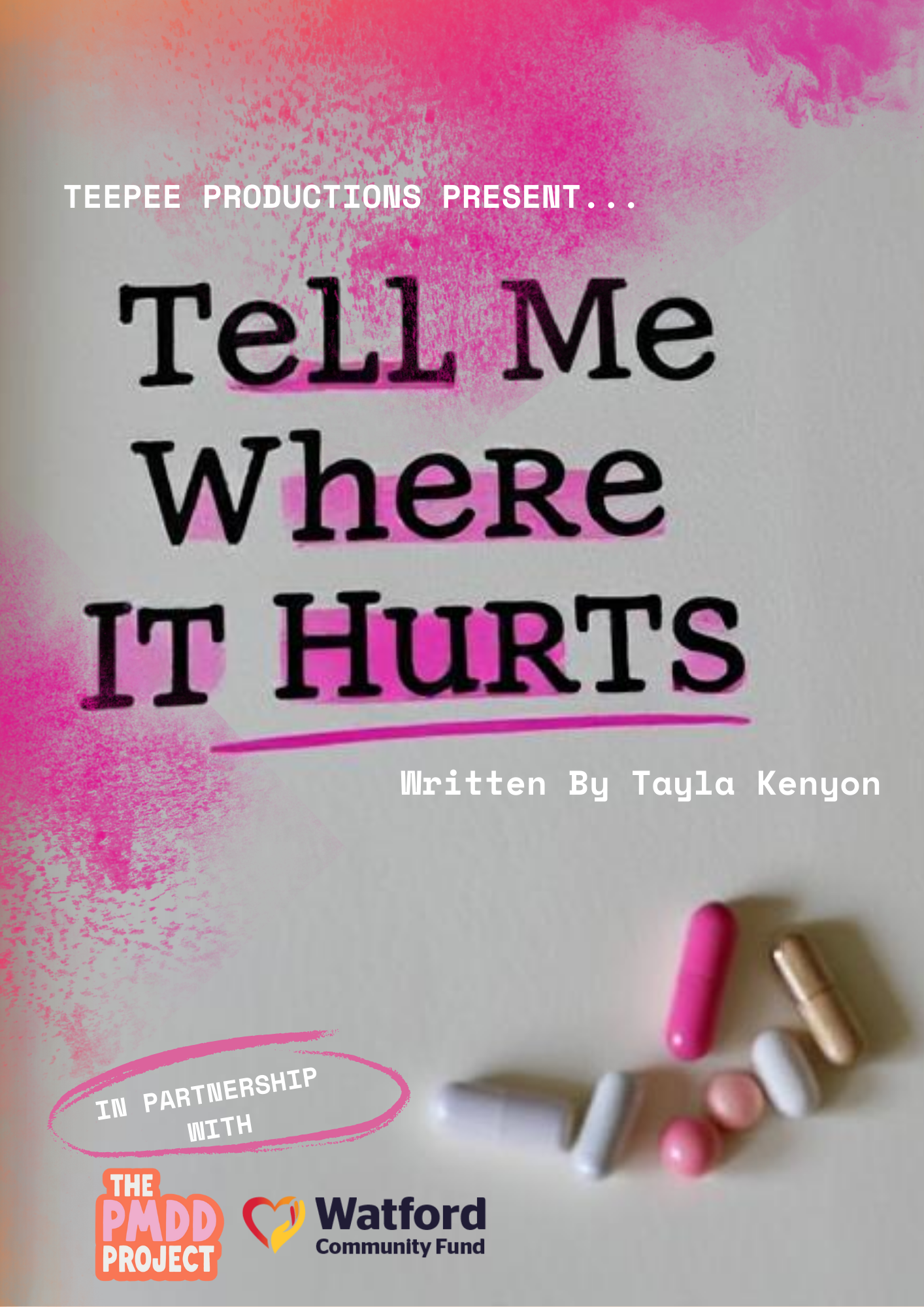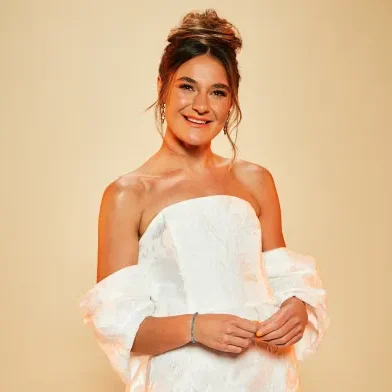Tell me where it hurts – a courageous new play about Premenstrual dysphoric disorder
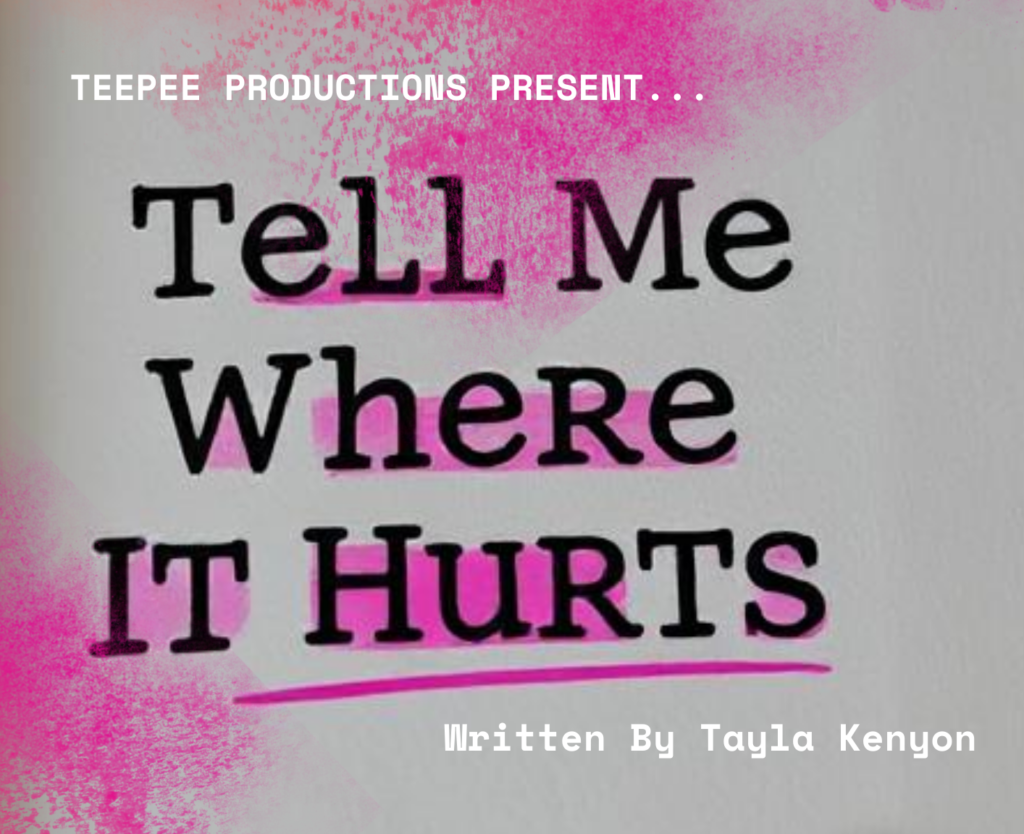
Kim Cormack (Trustee) Interviews James and Tayla (Teepee Productions) about their new work in progress “Tell me where it hurts”; a semi autobiographical piece about living with PMDD.
Getting to know you…
Teepee Productions was founded by co-writers James Piercy and Tayla Kenyon, who met online during a writing course. The two enjoyed each other’s writing and decided to work together, thus, there first creation ‘FLUFF’ was born. Teepee Productions prides itself in work that caters to communities and explores the complexity of human nature and relationships. They love to produce character driven work with witty, truthful dialogue, relatable to a range of audiences, asking them to reflect on the world we live in.
We began with a community tour of our show FLUFF, which worked in collaboration with Alzheimer’s Society, Trauma Breakthrough, and Herts Musical Memories, using theatre to raise awareness and spark conversations around important social issues. The production received critical acclaim, winning Best Performance & Best New Piece at Brum Fest and Best Theatre Production at Buxton Fringe. It also garnered a series of 4 and 5 star reviews, leading to a UK national tour, performances at Hay Festival 2024, and a short run at Theatre503. Following its success, FLUFF has now been published with Playdead Press and is available for purchase online.
First and foremost, we love telling stories. But beyond that, our biggest motivation is creating theatre that makes a difference—stories that need to be told, voices that aren’t being heard, and narratives that challenge, move, and change an audience in some way. Accessibility is also a huge driving force for us. Coming from working-class backgrounds and places with limited theatre access, we’re passionate about making theatre available to as many people as possible.

Why did you call the play Tell Me Where It Hurts?
The title comes from a phrase commonly used by doctors when diagnosing pain, but it also carries a deeper significance. PMDD is often misunderstood because its symptoms are not just physical—they are deeply emotional and psychological. The title plays on this idea, highlighting the frustration of seeking help for a some-what ‘invisible’ but very real condition. It’s also a broader nod to the experience of women’s pain, which is frequently dismissed or minimised in medical and societal spaces.
Tell us about the play.
Tell Me Where It Hurts follows Chrissy, a dedicated drama teacher navigating life with premenstrual dysphoric disorder (PMDD). She is determined to stage the school play while also mentoring Annie, a talented yet troubled student who is auditioning for a prestigious performing arts school. As both women wrestle with their own bodies and emotions, they find themselves facing a shared struggle—the feeling of being unheard and misunderstood by the world around them. At the same time, Chrissy is grappling with tensions in her personal life, particularly with her partner, Nathan, who longs for a child—a desire that clashes with her own uncertainties. The play sheds light on the resilience required to manage women’s health issues in a world that often fails to recognise them.
What inspired the play?
The play is deeply personal, inspired by my own journey with PMDD—my struggle for a diagnosis, my attempts to understand myself, and the impact it has had on my work and relationships.
As I developed the script, I conducted conversations and interviews with others who have experienced PMDD, weaving their insights into the narrative. Annie’s storyline, in particular, was inspired by my early years working as a teacher in a state school, where I witnessed the struggles many young women face as they navigate their own identities.
Recently, the Women and Equalities Commission published a report outlining misogyny and mass failings in many areas of Women’s Health.
- How Gender Bias in Medicine Has Shaped Women’s Health – Harvard Medicine
- ‘Medical misogyny’ condemns women to years of gynaecological pain, MPs told – Tobi Thomas, The Guardian
- ‘Medical misogyny’ is leaving women in unnecessary pain and undiagnosed for years. – UK Parliament. With link to Women and Equalities committee report, December 2024.
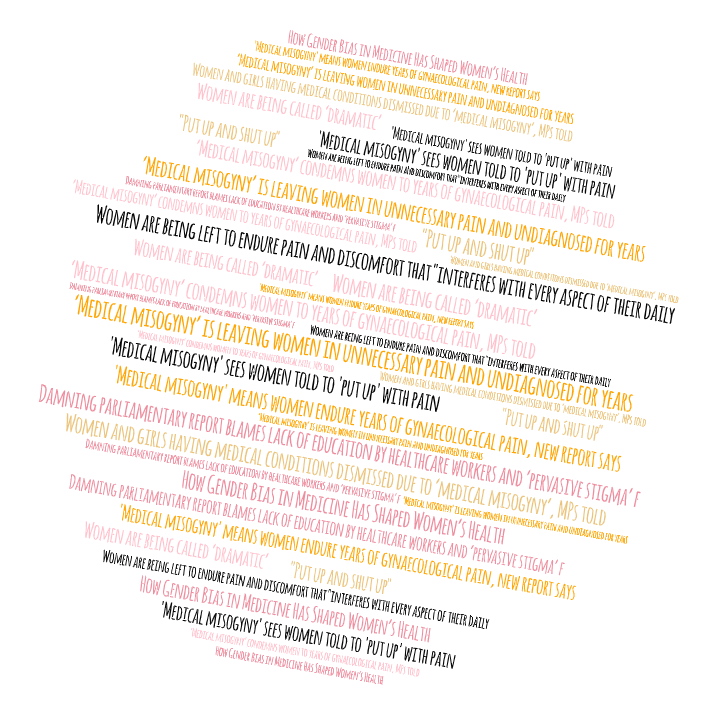
Without giving too much away, the theme of medical misogyny runs throughout the play. Why was this important to cover when writing about PMDD?
Unfortunately, medical misogyny is all too common and has been for centuries. Historically, women’s health concerns were often dismissed or misunderstood—consider how conditions like “hysteria” were once attributed to the so-called “wandering womb.” While we have certainly made progress since those days, the reality is that we are still far from true equity in medical research and care.
There remains a significant gap in medical research when it comes to women’s health, and it’s baffling that so many conditions—PMDD, endometriosis, and others—are only now beginning to receive the attention they deserve. For far too long, women have been left to suffer, told that their pain is “normal” or “in their heads,” despite knowing their bodies and recognising when something is wrong.
This play aims to highlight that struggle. It’s about more than just PMDD—it’s about the broader systemic failure to take women’s pain seriously. By bringing these issues to the stage, we hope to spark conversation and encourage change in how we approach women’s health.
An aspect of the play that really meant so much to me was the interpersonal relationships between the main character, Chrissy and other characters, including her romantic partner Nathan and her student, Annie.
As you know, PMDD can affect many areas of a woman’s life, but we rarely discuss how it can affect relationships and work. Why do you think that is?
I honestly don’t know why we don’t talk about it more. For me, PMDD has had a huge impact on both my relationships and my work life. One of the biggest struggles has been not just the lack of understanding from those around me, but also my own difficulty in understanding myself. PMDD can be unpredictable, overwhelming, and deeply isolating. It affects how we interact with others, how we manage stress, and how we navigate daily responsibilities. When someone is battling a condition like PMDD, the effects ripple outwards. We need to have open conversations about this—so that those with PMDD feel seen and supported, and so that those around them can better understand what they’re going through.
Again, without giving too much away, I felt so seen in the way the play explores the topic of fertility and planned parenthood through the eyes of someone with PMDD.
As someone who is having a hysterectomy this year because of PMDD, let me be the first to thank you for doing this.
Why did you choose to include this in the play? And do you have any thoughts on why this part of PMDD in particular isn’t discussed openly?
Honestly, beyond PMDD, I think conversations about women choosing not to have children—or even expressing doubts and fears about motherhood—are still somewhat taboo.
For many people with PMDD though, as you said, hysterectomy is one of the few treatment options, but it comes with an impossible decision: to potentially alleviate their suffering at the cost of never having biological children, or to continue living with a condition that severely impacts their well-being. That’s a choice no one should have to make lightly, as of course you will know.
Beyond that, I wanted to highlight Chrissy’s deeper fears—not just about how pregnancy and childbirth could affect her due to the drastic hormonal changes, but also about the possibility of passing PMDD onto a child. It’s an incredibly complex, deeply personal topic, and I hope the play provides a space for people to feel seen and understood in those emotions and start to discuss them more openly.
The play really does combine humour and pathos seamlessly. Was this a conscious choice?
Absolutely. James and I have a real passion for comedy dramas because they reflect life in the most honest way. Life is never just one thing—it’s a mix of highs and lows and it felt important to bring that balance into the play.
Humour can be a powerful tool, especially when dealing with heavy subjects like PMDD and women’s health. It allows us to connect, to find relief, and to process difficult emotions in a way that feels natural. We didn’t want the play to feel relentlessly heavy, but we also didn’t want to downplay the reality of the struggles the characters face. The goal was always to create something truthful.
Describe the play in four words or phrases.
RAW/TRUTHFUL
DARKLY FUNNY
UNAPOLOGETIC
URGENT
What are you hoping to achieve with the play?
With this play, we hope to raise awareness about PMDD, a condition that is still widely misunderstood, even within the medical community. By bringing it to the stage, we want to spark conversations and help more people recognise its impact. More importantly, we want women and young girls who struggle with PMDD to feel seen and heard, to know that their experiences are valid and that they are not alone. At the same time, we hope the play encourages greater understanding among those who live with or support someone with PMDD, helping them to be more compassionate, patient, and informed in their relationships.
Why did you choose to partner with The PMDD Project and were you surprised to learn that it is the only UK based charity focussing on PMDD?
Because you’re amazing! Honestly, the work you do is so inspiring, and it’s an absolute honour to be working with you. In some ways, I was surprised to learn that The PMDD Project is the only UK-based charity focused on PMDD, but in other ways, I wasn’t. When I first started learning about PMDD, around four/five years ago, I struggled to find any UK-based resources—most of what I came across were a handful of videos from the US. I spent so much time searching for advice, charities, and support, only to find almost nothing. That’s why it’s incredible and so important that we now have you, creating a space for awareness, advocacy, and community.
Who should see the play?
Honestly, we really think everyone should see this play- and that’s not just for more ticket sales! While it speaks directly to women, it’s just as important for the people around them—partners, brothers, fathers, friends, colleagues—to understand the realities of women’s health and how it impacts daily life. PMDD, like so many other women’s health conditions, is often misunderstood or overlooked, and the more people who are aware of it, the better support and empathy we can create as a society. So whether you personally relate to Chrissy, Nathan, or Annie’s story shouldn’t matter that much- we should all want to understand women’s health more.
Where and how can people see the play?
The play is still in its early stages of development, but we’ll be holding a rehearsed reading in April or May in Watford thanks to the support of the amazing Watford Community Fund. The best way to stay updated is by following our socials—especially our Instagram, @teepeeprods, where we regularly post news and updates about the production.
Future plans for play.
We’ve got big dreams for this one! After the development phase, we want the play to have a full run so as many people as possible can see it. Of course, this can’t happen without funding, so we’ve launched a fundraiser to help bring it to life. Beyond just performances, we want the show to actively support The PMDD Project by raising both awareness and funds. Accessibility is also a huge priority for us, so we’d love to offer a BSL-interpreted performance and a Touch Tour. Another big goal is to stage a performance specifically for medical professionals, helping to educate and spark conversations about PMDD in the healthcare space.
Finally, if you could give a message or advice to (the following), what would you say?
- A PMDD warrior
The same thing my Nan always told me: There’s always tomorrow. Unfortunately, the nature of PMDD means the symptoms can last longer than just one day, and it’s not always as simple as waiting for tomorrow. But I still hold onto that idea—the hardest days can feel impossible, and hard to see past, but the better days do come. It might not happen overnight, but they will come, and do you know what? We’re super strong because of this and that counts for something so keep going! Oh, and communicate with those you trust – don’t bottle it in and deal with it alone.
- Someone who thinks they may have PMDD but are struggling to get a diagnosis.
I know how frustrating and exhausting this is, and sadly, it’s an all-too-common experience. My advice is to reach out—connect with communities, seek support from charities like The PMDD Project, and arm yourself with as much information as possible. You deserve to be heard. And listen to your body; you’ll know if somethings wrong and if it is – keep pushing; understanding yourself is half the battle in some ways.
- A friend, family member or partner of someone with PMDD
I know it’s not always easy for them— I know we can be difficult to deal with. But I would ask them to do some research. Try to understand. PMDD can be overwhelming and confusing, especially for those of us experiencing it, so having a safe, supportive space with loved ones makes all the difference. Your patience and compassion mean more than you realise.
- An employer of a PMDD warrior.
Women’s health, as a whole, needs to be better understood and less taboo in the workplace. It’s difficult to sum up in one message because there is so much work to be done. But a good starting point? Believe your employees when they say they are struggling. Educate yourself. Be flexible where you can. Small changes—like acknowledging the impact of PMDD and allowing for accommodations—can make a huge difference in someone’s ability to thrive at work.
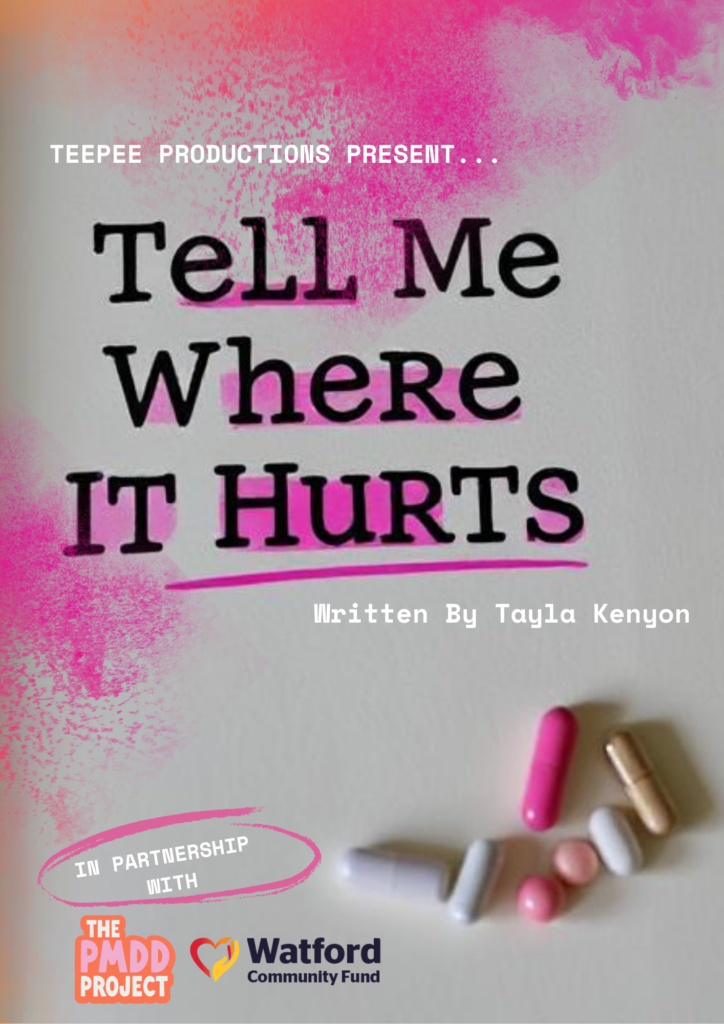
Exciting news!
IN MAY 2025 (DETAILS TO BE CONFIRMED), THERE WILL BE A REHEARSED READING OF “TELL ME WHER EIT HURTS” IN WATFORD AND A Q&A AFTERWARDS…
AND
THE PMDD PROJECT’S CEO, PHOEBE WILLIAMS AND KIM CORMACK (TRUSTEE… YES, THAT’S ME) WILL BE ON THE PANEL!!!!
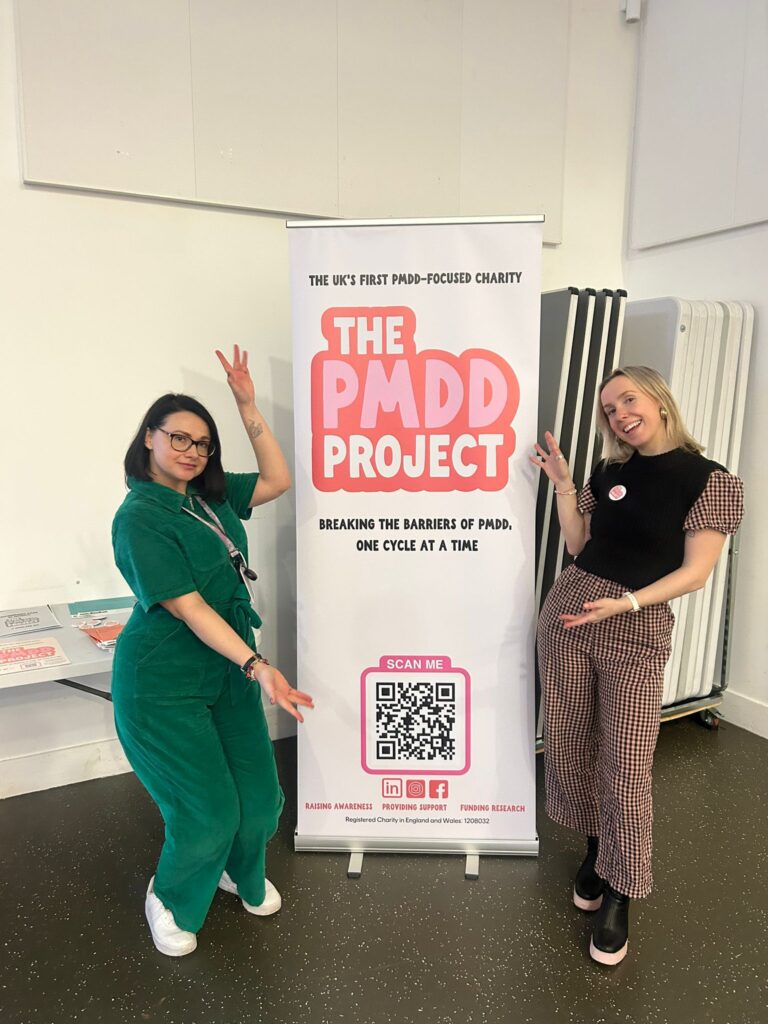
Keep an eye on our socials for updates & see you there!
xXx
